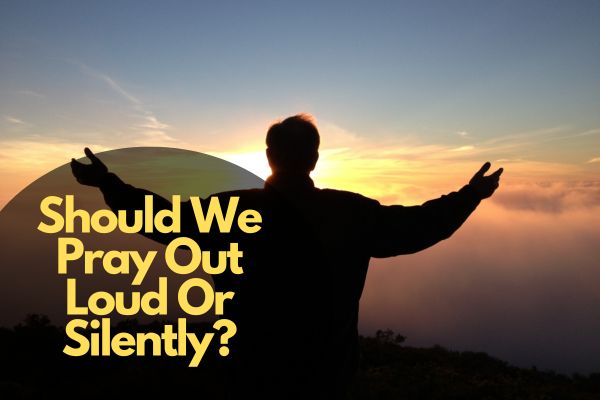Table of Contents Show
Prayer has long been a fundamental practice in various religious and spiritual traditions, serving as a means to connect with the divine and foster a deeper understanding of one’s spiritual self.
However, the manner in which individuals choose to engage in this act of devotion remains a subject of debate and contemplation. Should one pray out loud, expressing their thoughts and desires audibly, or should prayer be conducted silently, allowing for introspection and personal communion with the divine within one’s soul?
While some emphasize the significance of vocal prayer for communal worship and spiritual connection, others emphasize the merits of silent prayer for inner contemplation and privacy. Exploring the nuances of this inquiry provides invaluable insights into the diverse facets of the human spiritual experience.
Should We Pray Out Loud Or Silently?
When faced with the choice of praying aloud or silently, it’s essential to acknowledge that both methods hold significance and can deeply impact one’s spiritual journey. Each approach offers unique benefits and appeals to different individuals based on their personal inclinations and preferences. While vocal prayer allows for communal engagement and a powerful vocal expression of faith, silent prayer fosters a deeper, more introspective connection with the divine.
The Power of Prayer
In the realm of spirituality, prayer is recognized as a powerful tool for seeking guidance, solace, and spiritual fulfillment. It serves as a medium through which individuals express their gratitude, seek divine intervention, or simply find solace in the presence of a higher power. Regardless of the chosen method, the act of prayer remains deeply personal, reflecting an individual’s unique spiritual journey.
Understanding the Significance of Prayer
Prayer, in its essence, serves as a profound means of communication with a higher power. It acts as a bridge that connects the human spirit with the divine, fostering a sense of peace, solace, and spiritual nourishment. Throughout history, various religious and spiritual traditions have emphasized the practice of prayer as a central pillar of faith, underscoring its significance in nurturing a meaningful and purposeful life.
Unveiling the Power of Vocal Prayer
Its Significance and Benefits
Vocal prayer, or praying aloud, holds a special place in the hearts of many believers. Through the act of verbalizing one’s thoughts, emotions, and supplications, individuals can experience a sense of catharsis and emotional release. The vocal manifestation of prayers allows for a communal experience, creating a powerful atmosphere of unity, shared devotion, and collective worship.
Historical and Spiritual Significance
Praying out loud holds a significant place in the annals of spiritual history, serving as a communal practice that unifies individuals in their shared faith. From ancient rituals to contemporary congregational worship, vocal prayer fosters a sense of collective spirituality, reinforcing the idea of a community bound by shared beliefs and devotion.
Enhancing Concentration and Focus
The audible expression of prayer can serve as a catalyst for heightened concentration and focus, enabling individuals to articulate their thoughts and desires with clarity and conviction. By verbalizing their intentions, practitioners often experience a heightened sense of emotional release and spiritual connection, fostering a deeper sense of faith and devotion.
The Profound Impact of Silent Prayer
Contrastingly, silent prayer operates on a more intimate and personal level. By engaging in silent contemplation, individuals can navigate deep into their innermost thoughts, fostering a profound connection with the divine that transcends verbal expression. Silent prayer provides an opportunity for introspection, self-reflection, and heightened spiritual awareness, enabling individuals to establish a serene and tranquil space within their hearts and minds.
Understanding the Merits
Inner Reflection and Contemplation
Silent prayer, on the other hand, provides a sacred space for individuals to engage in profound introspection and self-reflection. By embracing silence, practitioners can look into the depths of their consciousness, fostering a profound connection with their inner spiritual essence.
Privacy and Personal Connection
The practice of silent prayer offers a sense of privacy and personal connection, allowing individuals to communicate with the divine in the sanctity of their innermost thoughts and emotions. This form of prayer facilitates a deeply personal and intimate relationship with the divine, fostering a sense of solace and emotional well-being.
Theological Perspectives on Vocal and Silent Prayer
Perspectives from Different Religions
Across various religious doctrines, perspectives on vocal and silent prayer vary, reflecting the diverse interpretations of spiritual communication. Some religions emphasize the communal aspect of vocal prayer, emphasizing the importance of collective worship, while others prioritize the individual connection fostered by silent contemplation.
Scriptural Insights on Vocal vs. Silent Prayer
Scriptural texts often provide insights into the significance of vocal and silent prayer, offering guidance on the appropriate contexts for each practice. These texts elucidate the spiritual benefits of both vocal and silent prayer, highlighting the nuances of each practice and their respective contributions to the spiritual journey of the faithful.
Impact of Cultural and Personal Beliefs on Prayer Practices
Cultural and personal beliefs significantly influence an individual’s approach to prayer, shaping their preferences for vocal or silent communication with the divine. Cultural traditions and societal norms often dictate the manner in which prayer is conducted, reflecting the collective values and spiritual customs prevalent in a particular community or society.
Advantages of Group Prayers and Vocalization
Participating in group prayers and vocalization fosters a sense of unity and shared spiritual experience, promoting a collective sense of faith and devotion. By engaging in communal vocal prayer, individuals can forge bonds with fellow believers, cultivating a sense of belonging within a larger spiritual community.
Benefits of Private, Silent Prayers for Personal Growth
Conversely, private, silent prayers offer individuals the opportunity for personal growth and spiritual development. By embracing the solitude of silent prayer, individuals can look into the depths of their consciousness, fostering a profound connection with their inner spiritual essence and facilitating personal transformation.
Striking a Balance: Combining Both Prayer Practices
Rather than viewing vocal and silent prayer as mutually exclusive, individuals can benefit from embracing a balanced approach that integrates both practices. By striking a harmonious balance between vocal and silent prayer, practitioners can experience the collective strength of communal worship and the profound introspection offered by private devotion.
Psychological and Neuroscientific Insights on Vocal and Silent Prayer
Psychological and neuroscientific studies have shed light on the impact of vocal and silent prayer on the human mind and brain. Research suggests that both forms of prayer stimulate distinct cognitive and emotional responses, contributing to a sense of well-being, emotional stability, and spiritual fulfillment.
Practical Tips for Effective Prayer, Regardless of Method
Regardless of the chosen method, effective prayer entails a combination of sincerity, focus, and spiritual devotion. Practitioners can enhance their prayer experience by creating a conducive environment, eliminating distractions, and fostering a deep sense of emotional and spiritual connection with the divine.
Understanding the Role of Intent and Sincerity in Prayer
The essence of prayer lies in the purity of intent and sincerity of the supplicant. Regardless of the chosen method, the authenticity and earnestness of one’s prayer hold paramount importance, as they reflect an individual’s genuine spiritual connection and devotion to the divine.
Overcoming Challenges in Prayer Practices
Challenges in prayer practices often arise from external distractions, internal doubts, or spiritual crises. Overcoming these challenges requires resilience, faith, and a commitment to spiritual growth, enabling practitioners to navigate the complexities of their spiritual journey with steadfast determination and unwavering devotion.
Embracing Personal Preferences and Comfort in Prayer
Ultimately, the choice between praying out loud or silently is a deeply personal one, shaped by individual preferences, spiritual inclinations, and emotional comfort. Embracing one’s unique prayer style fosters a sense of authenticity and spiritual fulfillment, enabling practitioners to cultivate a profound connection with the divine in a manner that resonates with their innermost beliefs and desires.
Addressing Common Misconceptions Surrounding Vocal and Silent Prayer
Misconceptions surrounding vocal and silent prayer often stem from a lack of understanding or misconstrued interpretations of spiritual practices. By addressing these misconceptions through open dialogue and educational discourse, individuals can foster a deeper appreciation for the diverse nuances of prayer, promoting a more inclusive and empathetic spiritual community.
In essence, the practice of prayer, whether conducted out loud or silently, embodies the essence of a personal spiritual journey, reflecting an individual’s unique relationship with the divine. By recognizing the multifaceted nature of prayer and embracing its diversity, individuals can embark on a transformative spiritual odyssey, fostering a profound connection with the divine and finding solace in the depths of their spiritual consciousness.
Conclusion
In the contemplation of whether to pray aloud or silently, it is vital to recognize that both approaches hold unique value and can significantly contribute to one’s spiritual growth and well-being. Whether you choose to vocalize your prayers to experience the communal power of shared devotion or prefer the introspective journey of silent contemplation, the act of prayer serves as a guiding light that nurtures the soul and fosters a deeper connection with the divine.
By recognizing the multifaceted nature of prayer and embracing its diversity, individuals can embark on a transformative spiritual odyssey, fostering a profound connection with the divine and finding solace in the depths of their spiritual consciousness.
FAQs
- Can I alternate between praying aloud and silently? Absolutely, incorporating both forms of prayer into your spiritual practice can offer a balanced and holistic approach to your devotional journey.
- Is one form of prayer more effective than the other? The effectiveness of prayer is subjective and depends on the individual’s personal connection with their spiritual beliefs. Both vocal and silent prayers can be equally powerful and transformative.
- How does prayer influence mental well-being? Prayer has been linked to reduced stress, increased emotional resilience, and a heightened sense of overall well-being, as it provides a channel for individuals to express their concerns and find solace in their faith.








